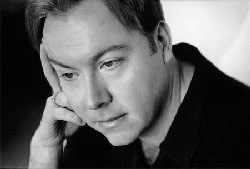by Mike Telin

“There is no shortage of repertoire dealing with the subject matter,” Keith Fitch, director of the CIM New Music Ensemble, said in a recent telephone conversation. “Chris Auerbach-Brown from MOCA and I were talking about that when we were planning the program, but all three pieces just kind of said, “Include Us!”
Thursday’s performance is what Fitch calls a progressive concert and begins at 8:00 pm in MOCA’s fourth floor Main Gallery with George Crumb’s Books II and III of Madrigals. “I haven’t programmed any Crumb since I’ve been at CIM, so I thought why not now. He’s such a figure in American music and I like the Madrigals. One of the challenges in a program with this subject matter is to not get too maudlin about things. Crumb sets the Madrigals to the poetry of Federico García-Lorca, which is beautiful. Although it does have references to death, his poetry is so gorgeous that it never becomes depressing.”
At 8:30 the concert moves to the Toby Devon Lewis Gallery for a performance by Pall Quinn Kalmansson of Donald Erb’s Suddenly It’s Evening for solo cello. “I like to do Don’s music whenever I can,” said Fitch. “He was such a figure at CIM and in the community for so long. This is one of his last pieces, and represents some of his musical thoughts from that period of his life, so that seemed to be a logical choice.”
The evening concludes at 9:15 in the Gund Commons with Harrison Birtwistle’s Cortege, a work that is very close to Fitch. “We gave the US premiere of the Cortege in the fall of 2008. It was my first concert at CIM and I’ve always wanted to do it again. It’s very difficult but very interesting. It has this wonderful ritualistic quality: the players move around like they do in a lot of Birtwistle’s music. All of the players step into solo roles and give kind of a musical eulogy, which fits the theme of this concert perfectly.
Scored for fourteen instrumentalists, the performers are arranged in a semicircle. The center of the performance area is reserved for whoever is performing the solo line. “The piece is performed without conductor, it’s all done via a series of cues between the players. And I think it will be a great experience for them to have to take the responsibility that is needed to play a large piece like this. It’s a complicated piece but they are really owning it.”
As a teacher, Fitch always approaches programming with two goals in mind. “There is the musical side but there is also the pedagogical side. It’s about exposing student performers to a wide variety of contemporary music and musical languages. I think that all three of these pieces provide great compliments and contrasts to each other. The Birtwistle and the Crumb are both pieces that students should experience and have the opportunity to study and perform.”
One thing that impresses Fitch about today’s students is their technical ability, which allows them to tackle pieces that would have been out of reach in the past, like the string quartets of Bartók. “Fifty years ago not many student quartets were playing them and now all six are being done in conservatories at an extraordinary high level.” But as Fitch points out, “you have to create an excitement about the music. I can’t program a piece that I don’t believe in because my excitement for a piece translates to the players. Their technical skills are great, so you have to get them into the right world for these pieces and then, just let them fly.”
Published on ClevelandClassical.com March 18, 2014
Click here for a printable version of this article.



